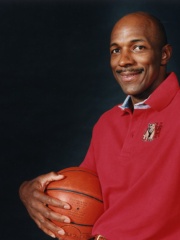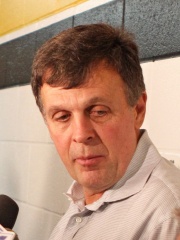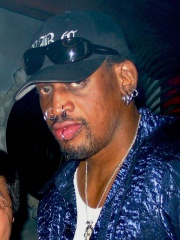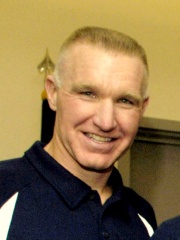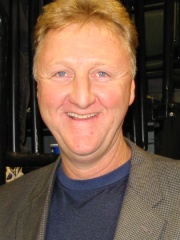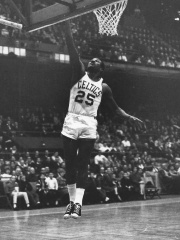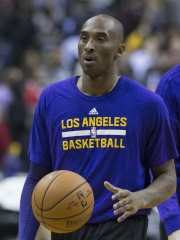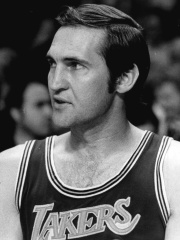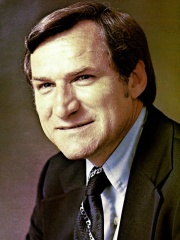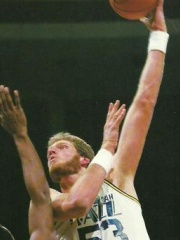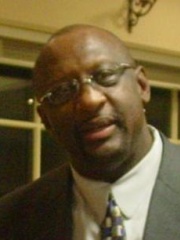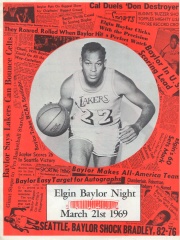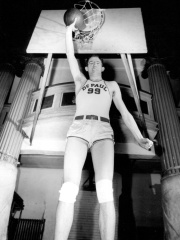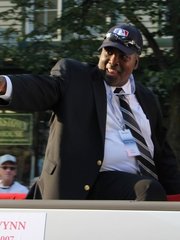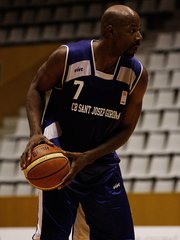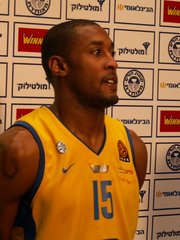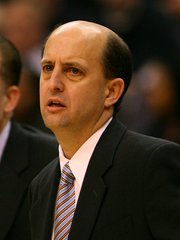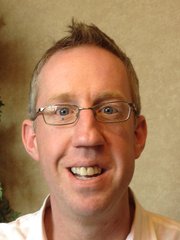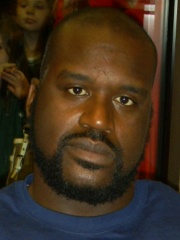

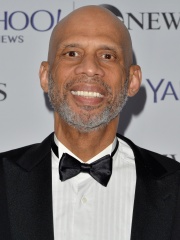
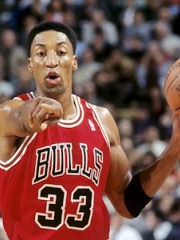
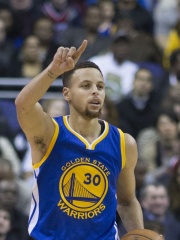
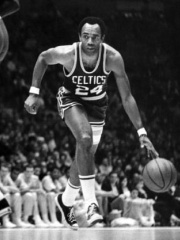
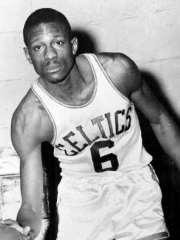
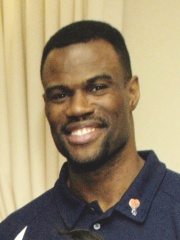
The Most Famous
BASKETBALL PLAYERS from United States
This page contains a list of the greatest American Basketball Players. The pantheon dataset contains 1,757 Basketball Players, 1,266 of which were born in United States. This makes United States the birth place of the most number of Basketball Players.
Top 10
The following people are considered by Pantheon to be the top 10 most legendary American Basketball Players of all time. This list of famous American Basketball Players is sorted by HPI (Historical Popularity Index), a metric that aggregates information on a biography's online popularity. Visit the rankings page to view the entire list of American Basketball Players.

1. Shaquille O'Neal (b. 1972)
With an HPI of 74.74, Shaquille O'Neal is the most famous American Basketball Player. His biography has been translated into 69 different languages on wikipedia.
Shaquille Rashaun O'Neal ( shə-KEEL; born March 6, 1972), commonly known as Shaq ( SHAK), is an American former professional basketball player who is a sports analyst on the television program Inside the NBA. He is a 7-foot-1-inch (2.16 m) and 325-pound (147 kg) center who played for six teams over his 19-year career in the National Basketball Association (NBA) and is a four-time NBA champion. O'Neal is widely regarded as one of the greatest basketball players and centers of all time. After playing college basketball for the LSU Tigers, O'Neal was selected by the Orlando Magic with the first overall pick in the 1992 NBA draft. He quickly became one of the best centers in the league, winning NBA Rookie of the Year in 1992–93 and leading his team to the 1995 NBA Finals. After four years with the Magic, O'Neal signed as a free agent with the Los Angeles Lakers. They won three consecutive championships in 2000, 2001, and 2002. Amid a feud between O'Neal and his teammate Kobe Bryant, O'Neal was traded to the Miami Heat in 2004, and his fourth NBA championship followed in 2006. Midway through the 2007–2008 season he was traded to the Phoenix Suns. After a season-and-a-half with the Suns, O'Neal was traded to the Cleveland Cavaliers in the 2009–10 season. O'Neal played for the Boston Celtics in the 2010–11 season before retiring. O'Neal's individual accolades include the 1999–2000 Most Valuable Player (MVP) Award; the 1992–93 NBA Rookie of the Year award; 15 All-Star Game selections, three All-Star Game MVP awards; three Finals MVP awards; two scoring titles; 14 All-NBA team selections, and three NBA All-Defensive Team selections. He is one of only three players to win NBA MVP, All-Star Game MVP and Finals MVP awards in the same year (2000); the other players are Willis Reed in 1970 and Michael Jordan in 1996 and 1998. He ranks 9th all-time in points scored, 6th in field goals, 15th in rebounds, and 8th in blocks. O'Neal was honored as one of the league's greatest players of all time by being named to the NBA 50th Anniversary Team in 1996. Due to his ability to dunk the basketball and score from close range, O'Neal also had a 58.2% career field goal percentage and led the league in field goal percentage ten times. O'Neal was elected into the Naismith Memorial Basketball Hall of Fame in 2016. He was elected to the FIBA Hall of Fame in 2017. In October 2021, O'Neal was again honored as one of the league's greatest players of all time by being named to the NBA 75th Anniversary Team. In addition to his basketball career, O'Neal has released four rap albums, with his first, Shaq Diesel, going platinum, and his second, Shaq Fu: Da Return, going gold. O'Neal is also an electronic music producer, and touring DJ, known as Diesel. He has appeared in numerous films and has starred in his own reality shows, Shaq's Big Challenge and Shaq Vs. He hosts The Big Podcast with Shaq. He was a minority owner of the Sacramento Kings from 2013 to 2022 and is the general manager of Kings Guard Gaming of the NBA 2K League. He is also the general manager of the Sacramento State Hornets men's basketball team.

2. Michael Jordan (b. 1963)
With an HPI of 74.53, Michael Jordan is the 2nd most famous American Basketball Player. His biography has been translated into 108 different languages.
Michael Jeffrey Jordan (born February 17, 1963), also known by his initials MJ, is an American businessman and retired professional basketball player who is a minority owner of the Charlotte Hornets of the National Basketball Association (NBA). He played 15 seasons in the NBA between 1984 and 2003, winning six NBA championships with the Chicago Bulls. Widely considered to be one of the greatest players of all time, he was integral in popularizing basketball and the NBA around the world in the 1980s and 1990s. He is one of the world's richest celebrities, with a $3.8 billion net worth as of 2025. Jordan played college basketball with the North Carolina Tar Heels. As a freshman, he was a member of the Tar Heels' national championship team in 1982. Jordan joined the Bulls in 1984 as the third overall draft pick and emerged as a league star, entertaining crowds with his prolific scoring while gaining a reputation as one of the best defensive players. His leaping ability, demonstrated by performing slam dunks from the free-throw line in Slam Dunk Contests, earned him the nicknames "Air Jordan" and "His Airness". Jordan won his first NBA title with the Bulls in 1991 and followed that with titles in 1992 and 1993, securing a three-peat. Citing physical and mental exhaustion from basketball and superstardom, Jordan abruptly retired before the 1993–94 NBA season to play Minor League Baseball in the Chicago White Sox organization. He returned to the Bulls in 1995 and led them to three more championships in 1996, 1997, and 1998, as well as a then-record 72 regular season wins in the 1995–96 NBA season. Jordan retired for the second time in 1999, returning for two NBA seasons from 2001 to 2003 as a member of the Washington Wizards. He was selected to play for the United States national team during his college and NBA careers, winning four gold medals—at the 1983 Pan American Games, 1984 Summer Olympics, 1992 Tournament of the Americas and 1992 Summer Olympics—while also being undefeated. Jordan's individual accolades include six NBA Finals Most Valuable Player (MVP) awards, 10 NBA scoring titles (both all-time records), five NBA MVP awards, 10 All-NBA First Team designations, nine All-Defensive First Team honors, 14 NBA All-Star Game selections, and three NBA All-Star Game MVP awards. He holds the NBA records for career regular season scoring average (30.1 points per game) and career playoff scoring average (33.4 points per game). He is one of only eight players to achieve the basketball Triple Crown. In 1999, Jordan was named the 20th century's greatest North American athlete by ESPN and was second to Babe Ruth on the Associated Press' list of athletes of the century. Jordan was twice inducted into the Naismith Memorial Basketball Hall of Fame, once in 2009 for his individual career, and in 2010 as part of the 1992 United States men's Olympic basketball team ("The Dream Team"). The trophy for the NBA Most Valuable Player Award is named in his honor. One of the most effectively marketed athletes ever, Jordan made many product endorsements. He fueled the success of Nike's Air Jordan sneakers, which were introduced in 1984 and remain popular. Jordan starred as himself in the live-action/animation hybrid film Space Jam (1996) and was the focus of the Emmy-winning documentary series The Last Dance (2020). He became part-owner and head of basketball operations for the Charlotte Hornets (then named the Bobcats) in 2006 and bought a controlling interest in 2010, before selling his majority stake in 2023. Jordan is a co-owner of 23XI Racing in the NASCAR Cup Series. In 2014, he became the first billionaire player in NBA history. In 2016, President Barack Obama awarded Jordan the Presidential Medal of Freedom.

3. Kareem Abdul-Jabbar (b. 1947)
With an HPI of 72.57, Kareem Abdul-Jabbar is the 3rd most famous American Basketball Player. His biography has been translated into 79 different languages.
Kareem Abdul-Jabbar (born Ferdinand Lewis Alcindor Jr., April 16, 1947) is an American former basketball player. He played professionally for 20 seasons for the Milwaukee Bucks and Los Angeles Lakers in the National Basketball Association (NBA), and played college basketball for the UCLA Bruins as a center. A member of the Naismith Memorial Basketball Hall of Fame, Abdul-Jabbar won a record six NBA Most Valuable Player (MVP) awards. He was a 19-time NBA All-Star, a 15-time All-NBA Team member, and an 11-time NBA All-Defensive Team selection. He was a member of six NBA championship teams as a player and two more as an assistant coach, and was twice voted the NBA Finals MVP. He was named to three NBA anniversary teams (35th, 50th, and 75th). Widely regarded as one of the greatest players of all time, Abdul-Jabbar broke the NBA's career scoring record in 1984, and held it until LeBron James surpassed him in 2023. Abdul-Jabbar was known as Lew Alcindor when he played at Power Memorial, a private Catholic high school in New York City, where he led their team to 71 consecutive wins. He played college basketball for the UCLA Bruins, winning three consecutive national championships under head coach John Wooden. Alcindor was a record three-time most outstanding player of the NCAA tournament. Drafted with the first overall pick by the one-season-old Milwaukee Bucks franchise in the 1969 NBA draft, he spent six seasons with the team. After leading the Bucks to their first NBA championship at age 24 in 1971, he took the Muslim name Kareem Abdul-Jabbar. Using his trademark skyhook shot, he established himself as one of the league's top scorers. In 1975, he was traded to the Lakers, with whom he played the final 14 seasons of his career, during which time the team won five NBA championships. Abdul-Jabbar's contributions were a key component in the Showtime era of Lakers basketball. Over his 20-year NBA career, his teams reached the playoffs 18 times, got past the first round 14 times, and reached the NBA Finals ten times. At the time of his retirement at age 42 in 1989, Abdul-Jabbar was the NBA's regular season career leader in points (38,387), games played (1,560), minutes (57,446), field goals made (15,837), field goal attempts (28,307), blocked shots (3,189), defensive rebounds (9,394), and personal fouls (4,657). He remains the all-time leader in field goals made. He ranks second in career points, minutes played and field goal attempts, and is third all-time in both total rebounds (17,440) and blocked shots. ESPN named him the greatest center of all time in 2007, the greatest player in college basketball history in 2008, and the second best player in NBA history (behind Michael Jordan) in 2016. Abdul-Jabbar has also been an actor, a basketball coach, a best-selling author, and a martial artist, having trained in Jeet Kune Do under Bruce Lee and appeared in his film Game of Death (1972). In 2012, Abdul-Jabbar was selected by Secretary of State Hillary Clinton to be a U.S. global cultural ambassador. In 2016, President Barack Obama awarded him the Presidential Medal of Freedom.

4. Scottie Pippen (b. 1965)
With an HPI of 72.16, Scottie Pippen is the 4th most famous American Basketball Player. His biography has been translated into 51 different languages.
Scotty Maurice Pippen Sr. (born September 25, 1965), commonly known as Scottie Pippen, is an American former professional basketball player who played 17 seasons in the National Basketball Association (NBA), winning six NBA championships with the Chicago Bulls. Considered one of the greatest small forwards of all time, Pippen played an important role in transforming the Bulls into a championship team and popularizing the NBA around the world during the 1990s. Pippen was named to the NBA All-Defensive First Team eight consecutive times and the All-NBA First Team three times. He was a seven-time NBA All-Star and was the NBA All-Star Game MVP in 1994. He was named one of the 50 Greatest Players in NBA History during the 1996–97 season, and is one of four players to have his jersey retired by the Chicago Bulls (the others being Jerry Sloan, Bob Love, and Michael Jordan). He played a main role on both the 1992 Chicago Bulls Championship team and the 1996 Chicago Bulls Championship team, which were selected as two of the Top 10 Teams in NBA History. His biography on the Naismith Basketball Hall of Fame's website states that "the multidimensional Pippen ran the court like a point guard, attacked the boards like a power forward, and swished the nets like a shooting guard." During his 17-year career, he played 12 seasons with the Bulls, one with the Houston Rockets and four with the Portland Trail Blazers, making the postseason 16 consecutive times. In October 2021, Pippen was again honored as one of the league's greatest players of all time by being named to the NBA 75th Anniversary Team. Pippen is one of the only two NBA players to have won an NBA title and Olympic gold medal in the same year twice (the other one is Jrue Holiday), having done so in both 1992 and 1996. He was a part of the 1992 U.S. Olympic "Dream Team" which beat its opponents by an average of 44 points. He was also a key figure in the 1996 Olympic team, alongside former "Dream Team" members Karl Malone, John Stockton, Charles Barkley, and David Robinson, as well as newer faces such as Shaquille O'Neal, Anfernee "Penny" Hardaway and Grant Hill. He wore the number 8 during both years. Pippen is a two-time inductee into the Naismith Memorial Basketball Hall of Fame, once for his individual career and once as a member of the "Dream Team", having been simultaneously inducted for both on August 13, 2010. The Bulls retired his number 33 on December 8, 2005. The University of Central Arkansas retired his number 33 on January 21, 2010. He was formerly married to television personality Larsa Pippen, and is the father of NBA basketball player Scotty Pippen Jr. and college basketball player Justin Pippen
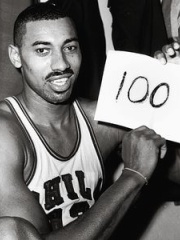
5. Wilt Chamberlain (1936 - 1999)
With an HPI of 71.64, Wilt Chamberlain is the 5th most famous American Basketball Player. His biography has been translated into 65 different languages.
Wilton Norman Chamberlain ( CHAYM-bər-lin; August 21, 1936 – October 12, 1999) was an American professional basketball player. Standing 7 feet 1 inch (2.16 m) tall, he played center in the National Basketball Association (NBA) for 14 seasons. He was enshrined in the Naismith Memorial Basketball Hall of Fame in 1978, and was elected to the NBA's 35th, 50th, and 75th anniversary teams. Chamberlain is widely considered to be one of the greatest basketball players of all time. According to former teammate Billy Cunningham, "The NBA Guide reads like Wilt's personal diary." Chamberlain holds 72 NBA records, including several regular season records in scoring, rebounding, and durability; blocks were not counted during his career. He is best remembered as the only player to score 100 points in a single game. He also once gathered 55 rebounds, and never fouled out. Chamberlain is the only player to average 30 points and 20 rebounds per game in a season, a feat he accomplished seven times. He once averaged 50 points per game, as well as 48 minutes per game, in a season. Chamberlain ultimately won two NBA championships, four regular-season Most Valuable Player (MVP) awards, the Rookie of the Year, one Finals MVP, and one All-Star Game MVP; he was selected to thirteen All-Star Games and ten All-NBA Teams (seven First and three Second teams). He won seven scoring, eleven rebounding, nine durability, and nine field goal percentage titles; he is the only center to lead the league in total assists. While in college, Chamberlain played for the Kansas Jayhawks, and lost the national championship game to the North Carolina Tar Heels in triple overtime his sophomore year. He also played for the Harlem Globetrotters before joining the NBA, where he played for the Philadelphia / San Francisco Warriors, Philadelphia 76ers, and Los Angeles Lakers. Chamberlain had an on-court rivalry with Boston Celtics' center Bill Russell, suffering a long string of losses before breaking through and winning the 1967 NBA Finals as a member of the 76ers. Chamberlain won his second championship as a member of the 1972 Lakers, a team which set a record with a 33-game winning streak. Following his professional basketball career, Chamberlain played volleyball in the short-lived International Volleyball Association (IVA). He served one term as league president and is enshrined in the IVA Hall of Fame. Sportswriters had known Chamberlain by several nicknames during his playing career, calling attention to his height since his high school days. He disliked the ones that negatively portrayed his height, such as "Wilt the Stilt" and "Goliath", preferring "the Big Dipper", inspired by his friends who saw him dip his head as he walked through doorways. The name was retained in one of Chamberlain's signature moves, the "dipper dunk". He was one of the first players to make prominent use of shots like the fade away jump shot, and the finger roll. His success near the basket led to the widening of the lane, offensive goaltending rules, and the banning of inbound passes over the backboard. Chamberlain, always a poor free throw shooter, had the ability to dunk from the foul line, which led to the ruling that a free-throw shooter must keep his feet behind the line.

6. Stephen Curry (b. 1988)
With an HPI of 68.35, Stephen Curry is the 6th most famous American Basketball Player. His biography has been translated into 70 different languages.
Wardell Stephen Curry II ( STEF-ən; born March 14, 1988), also known as Steph Curry ( STEF), is an American professional basketball player for the Golden State Warriors of the National Basketball Association (NBA), where he plays as a point guard. Nicknamed "Chef Curry", he is widely regarded as the greatest shooter in basketball history and is credited with revolutionizing the game by popularizing the three-point shot across all levels of basketball. He is a four-time NBA champion, a two-time NBA Most Valuable Player (MVP), an NBA Finals MVP, and a two-time NBA All-Star Game MVP. He is also a two-time NBA scoring champion, an eleven-time NBA All-Star, and an eleven-time All-NBA Team selection (including four on the First Team). Internationally, he has won two gold medals at the FIBA World Cup and a gold medal at the 2024 Summer Olympics as part of the U.S. national team. Curry played collegiately for the Davidson Wildcats, where he was named Conference Player of the Year twice. He set the NCAA single-season record for three-pointers made (162) as a sophomore and led the NCAA Division I in scoring during his junior year. Curry was selected by the Warriors as the seventh overall pick in the 2009 NBA draft. In 2014–15, Curry won his first league MVP award and led the Warriors to their first championship since 1975. The following season, he became the first player to be unanimously voted MVP and led the league in scoring while shooting above 50–40–90. That same year, the Warriors broke the record for most wins in a regular season (73) en route to the 2016 NBA Finals, where they squandered a 3–1 series lead to the Cleveland Cavaliers. Curry then helped the Warriors win back-to-back titles in 2017 and 2018, and reach the 2019 NBA Finals, where they fell to the Toronto Raptors in six games. After struggling with injuries and missing the playoffs in 2020 and 2021, Curry won his fourth championship and first Finals MVP award in 2022, leading the Warriors past the Boston Celtics in six games. That same season, he became the NBA's all-time leader in three-pointers made, surpassing Ray Allen. Curry has the highest career free-throw percentage in NBA history (.911) and has led the league in three-pointers made a record eight times. In 2016, he broke his own record for three-pointers made in a regular season, with 402, and made at least one three-pointer in an NBA-record 268 consecutive games from 2018 to 2023.

7. Sam Jones (1933 - 2021)
With an HPI of 68.12, Sam Jones is the 7th most famous American Basketball Player. His biography has been translated into 28 different languages.
Samuel Jones (June 24, 1933 – December 30, 2021) was an American professional basketball player who was a shooting guard for the Boston Celtics in the National Basketball Association (NBA). A five-time NBA All-Star, he was nicknamed "Mr. Clutch" and "the Shooter" for his quickness and game-winning shots, especially during the NBA playoffs. Jones has the second most NBA championships of any player (10), behind only his teammate Bill Russell (11). He was also one of only three Celtics (along with teammates Russell and K. C. Jones) to be part of each of the Celtics' eight consecutive championships from 1959 to 1966. Jones is a member of the Naismith Memorial Basketball Hall of Fame.

8. Bill Russell (1934 - 2022)
With an HPI of 68.02, Bill Russell is the 8th most famous American Basketball Player. His biography has been translated into 59 different languages.
William Felton Russell (February 12, 1934 – July 31, 2022) was an American professional basketball player who played center for the Boston Celtics of the National Basketball Association (NBA) from 1956 to 1969. He was the centerpiece of the Celtics dynasty that played for 12 NBA championships and won 11 during his 13-year career. Russell is widely considered to be one of the greatest basketball players of all time. Russell played college basketball for the San Francisco Dons, leading them to consecutive NCAA championships in 1955 and 1956. He was named NCAA tournament Most Outstanding Player (MOP), and captained the gold medal-winning U.S. national basketball team at the 1956 Summer Olympics. These victories along with his NBA championships made Russell one of only eight players in the history of basketball to achieve the Triple Crown. After being chosen by the St. Louis Hawks with the second overall pick in the 1956 NBA draft, Russell was traded to the Boston Celtics for Celtics center Ed Macauley and small forward Cliff Hagan. With Russell as their starting center and defensive anchor, the Celtics went on to win their first NBA championship in 1957 and won an NBA record eight consecutive championships from 1959 to 1966. A five-time NBA Most Valuable Player (MVP) and a 12-time NBA All-Star, Russell's rebounding, defense, and leadership made him one of the dominant players of his era. Standing at 6 ft 10 in (2.08 m) tall, with a 7-foot-4-inch (2.24 m) arm span, his shot-blocking and man-to-man defense were major reasons for the Celtics' dominance during his career. Russell also led the NBA in rebounds four times, had a dozen consecutive seasons of 1,000 or more rebounds, and remains second all-time in both total rebounds and rebounds per game. Russell played in the wake of black pioneers Earl Lloyd, Chuck Cooper, and Sweetwater Clifton, and he was the first black player to achieve superstar status in the NBA. During the final three seasons of his career (1966–1969), he served as player-coach of the Celtics, becoming the first black NBA coach to win a championship. Russell ended his playing career and left his position as Celtics coach after helping the Celtics win the 1969 NBA championship. Russell served as head coach and general manager of the Seattle SuperSonics from 1973 to 1977. He also coached the Sacramento Kings from 1987 to 1988. Russell also worked as a color commentator and authored several books. Russell was inducted into the Naismith Memorial Basketball Hall of Fame in 1975, was one of the founding inductees into the National Collegiate Basketball Hall of Fame in 2006 and was enshrined in the FIBA Hall of Fame in 2007. He was selected into the NBA 25th Anniversary Team in 1971 and the NBA 35th Anniversary Team in 1980, was named as one of the 50 Greatest Players in NBA History in 1996 (being one of only four players to receive all three honors), and was selected to the NBA 75th Anniversary Team in 2021. In 2009, the NBA renamed the NBA Finals MVP Award in his honor. In 2011, Barack Obama awarded Russell the Presidential Medal of Freedom for his accomplishments on the court and in the civil rights movement. In 2021, Russell was inducted into the Naismith Memorial Basketball Hall of Fame a second time in recognition of his coaching career. Shortly after his death in 2022, the NBA retired Russell's #6 jersey league-wide, making him the only player in NBA history to receive that honor, as well as the third person in North American major professional sports to have their jersey number retired league-wide, behind Jackie Robinson and Wayne Gretzky.

9. David Robinson (b. 1965)
With an HPI of 67.84, David Robinson is the 9th most famous American Basketball Player. His biography has been translated into 46 different languages.
David Maurice Robinson (born August 6, 1965) is an American former professional basketball player who played for the San Antonio Spurs in the National Basketball Association (NBA) from 1989 to 2003, and is now a minority owner of the team. Nicknamed "the Admiral" for his time spent in the U.S. Navy, Robinson was a 10-time NBA All-Star, the 1995 NBA MVP, a two-time NBA champion (1999 and 2003), a two-time Olympic Gold Medal winner (1992, 1996), a two-time Naismith Memorial Basketball Hall of Fame inductee (2009 for his individual career; 2010 as a member of the 1992 United States men's Olympic basketball "Dream Team" ). Robinson is also a two-time U.S. Olympic Hall of Fame inductee (2008 individually, 2009 as a member of the 1992 Olympic team). He was honored as one of the league's all-time players by being named to the NBA 50th Anniversary (1996) and 75th Anniversary Teams (2021). He is widely considered one of the greatest centers in both college basketball and NBA history.
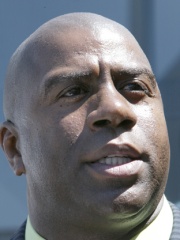
10. Magic Johnson (b. 1959)
With an HPI of 67.81, Magic Johnson is the 10th most famous American Basketball Player. His biography has been translated into 71 different languages.
Earvin "Magic" Johnson Jr. (born August 14, 1959) is an American businessman and former professional basketball player. Often regarded as the greatest point guard of all time, Johnson spent his entire career with the Los Angeles Lakers in the National Basketball Association (NBA). After winning a national championship with the Michigan State Spartans in 1979, Johnson was selected first overall in the 1979 NBA draft by the Lakers, then led the team to five NBA championships during their "Showtime" era. Johnson retired abruptly in 1991 after announcing that he had contracted HIV, but returned to play in the 1992 All-Star Game, winning the All-Star MVP Award. He retired again after fellow players protested his return, but returned in 1996, at age 36, to play 32 games for the Lakers before retiring for the third and final time. Known for his extraordinary court vision, passing abilities, and leadership, Johnson was one of the most dominant players of his era. He received three NBA Most Valuable Player Awards, three NBA Finals MVP awards, nine All-NBA First Team designations, and twelve All-Star Game selections. He led the league in regular-season assists four times. Johnson holds the NBA records for average assists per game in the regular season (11.19) and in the playoffs (12.35 assists per game). He also holds the NBA playoffs records for most career assists and triple-doubles. Johnson was the co-captain of the 1992 United States men's Olympic basketball team ("The Dream Team"), which won the Olympic gold medal in Barcelona. Johnson is one of eight players to achieve the basketball Triple Crown. After leaving the NBA in 1991, he formed the Magic Johnson All-Stars, a barnstorming team that traveled around the world playing exhibition games. Johnson was honored as one of the 50 Greatest Players in NBA History in 1996 and selected to the NBA 75th Anniversary Team in 2021, and became a two-time inductee into the Naismith Memorial Basketball Hall of Fame—being enshrined in 2002 for his individual career and as a member of the Dream Team in 2010. His friendship and rivalry with Boston Celtics star Larry Bird, whom he faced in the 1979 NCAA finals and three NBA championship series, are well-documented. Since his retirement, Johnson has been an advocate for HIV/AIDS prevention and safe sex, as well as an entrepreneur, philanthropist, broadcaster, and motivational speaker. Johnson is a former part-owner of the Lakers and was the team's president of basketball operations in the late 2010s. He is a founding member of Guggenheim Baseball Management, the managing entity of the Los Angeles Dodgers (MLB). He is part of ownership groups of the Los Angeles Sparks (WNBA), Los Angeles FC (MLS), the Washington Commanders (NFL), and the Washington Spirit (NWSL). Johnson has won 16 championships during his career: one in college, five as an NBA player, and ten as an owner. In 2025, Johnson received the Presidential Medal of Freedom, the highest civilian award of the United States. As of May 2025, his net worth is estimated at US$1.5 billion by Forbes.
People
Pantheon has 1,266 people classified as American basketball players born between 1907 and 2006. Of these 1,266, 1,125 (88.86%) of them are still alive today. The most famous living American basketball players include Shaquille O'Neal, Michael Jordan, and Kareem Abdul-Jabbar. The most famous deceased American basketball players include Wilt Chamberlain, Sam Jones, and Bill Russell. As of April 2024, 185 new American basketball players have been added to Pantheon including Tony Gwynn, Darryl Middleton, and Wendell Alexis.
Living American Basketball Players
Go to all RankingsShaquille O'Neal
1972 - Present
HPI: 74.74
Michael Jordan
1963 - Present
HPI: 74.53
Kareem Abdul-Jabbar
1947 - Present
HPI: 72.57
Scottie Pippen
1965 - Present
HPI: 72.16
Stephen Curry
1988 - Present
HPI: 68.35
David Robinson
1965 - Present
HPI: 67.84
Magic Johnson
1959 - Present
HPI: 67.81
Clyde Drexler
1962 - Present
HPI: 67.41
Kevin McHale
1957 - Present
HPI: 66.51
Dennis Rodman
1961 - Present
HPI: 65.79
Chris Mullin
1963 - Present
HPI: 64.86
Larry Bird
1956 - Present
HPI: 64.72
Deceased American Basketball Players
Go to all RankingsWilt Chamberlain
1936 - 1999
HPI: 71.64
Sam Jones
1933 - 2021
HPI: 68.12
Bill Russell
1934 - 2022
HPI: 68.02
K. C. Jones
1932 - 2020
HPI: 66.98
Kobe Bryant
1978 - 2020
HPI: 66.56
Jerry West
1938 - 2024
HPI: 64.89
Dean Smith
1931 - 2015
HPI: 63.78
Mark Eaton
1957 - 2021
HPI: 63.50
Bob Lanier
1948 - 2022
HPI: 62.21
Jim "Bad News" Barnes
1941 - 2002
HPI: 61.49
Elgin Baylor
1934 - 2021
HPI: 61.10
George Mikan
1924 - 2005
HPI: 60.56
Newly Added American Basketball Players (2025)
Go to all RankingsTony Gwynn
1960 - 2014
HPI: 47.23
Darryl Middleton
1966 - Present
HPI: 47.03
Wendell Alexis
1964 - Present
HPI: 46.49
Lea Henry
1961 - Present
HPI: 42.82
Tammy Jackson
1962 - Present
HPI: 42.04
Will Solomon
1978 - Present
HPI: 41.21
Michael Adams
1963 - Present
HPI: 41.10
Jeff Van Gundy
1962 - Present
HPI: 41.06
Nate Huffman
1975 - 2015
HPI: 40.97
Kevin Punter
1993 - Present
HPI: 40.88
Kevin Duckworth
1964 - 2008
HPI: 40.57
Terry Cummings
1961 - Present
HPI: 40.49
Overlapping Lives
Which Basketball Players were alive at the same time? This visualization shows the lifespans of the 25 most globally memorable Basketball Players since 1700.

